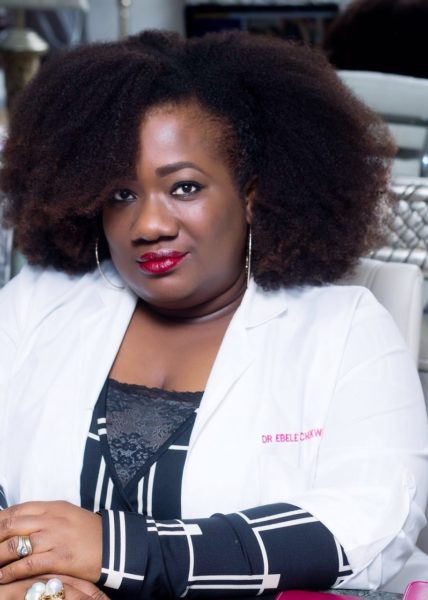Features
Love Your Skin with Dr. Ebele Ugochukwu: Let’s Talk About Skin Lightening, Toning & Bleaching
 This is a big topic and so relevant to us in our society that I have divided into two parts.
This is a big topic and so relevant to us in our society that I have divided into two parts.
Let’s get the terminology right first. Skin lightening as the name implies is the process of lightening your skin by a couple of shades or more.
Skin bleaching is the process of attempting to strip your skin completely of melanin. This process is very dangerous, invasive and can lead to many unwanted side effects.
Skin toning is a colloquial term that implies the lightening of the tone/shade of your skin. FYI, skin toning is also the process of balancing the ph of your skin with the application of a toner which is a liquid agent usually applied to the face after washing using a cotton ball or pad. However, In Nigeria Toning is almost always referring to skin lightening.
Why do we feel that lighter skin is better, what makes us assume that a light skinned person is always more appealing than a darker skinned person?
The answer is obviously centuries old…..When our ancestors were living in Africa centuries ago there was no light skin/dark skin debate until the white man arrived on the shores of our continent and abducted a vast majority of Africans as slaves.
Everyone knows the degradation, segregation, humiliation and plight of the enslaved black man up to and especially after the abolition of slavery. The white slave masters regularly impregnated their African female slaves leading to the birth of children with light skin who got more privileges than their dark skinned neighbours and so the idea that light skin is better took hold and grew in bounds. Obviously at the time, being lighter meant an easier smoother ride in life.
This belief system has taken root deep down and has evolved to fair/light skin being the standard of beauty. As we who remained back in Africa became more westernised all in the name of growth and development; this way of thinking has completely pervaded our society.
A lot of education has gone on in recent time to disabuse ourselves of this notion but like I said it is ingrained and will take time for us to shake it off.
True Beauty is in healthy, glowing, radiant, blemish free skin irrespective of the shade. We need to love ourselves wholly and totally in whatever skin colour we have been given. We MUST teach our sons and daughters to love themselves as they are.
It is a journey but if we keep passing the message along, we will get there.
Even in Asia, lighter skin depicts wealth and status while dark skin depicts poverty and servitude especially in India. That is one of the reasons Asia is the world leader in all things skin lightening.
To be clear Skin bleaching is not acceptable in any form or way. This is when you want to change your skin colour totally and go from being a dark or medium toned individual to a light skinned person. This is dangerous and completely unsustainable.
However, there is nothing wrong in wanting to maintain the natural radiance of your complexion.
As we age, our skin naturally darkens especially on the exposed areas of our bodies; one can safely lighten these areas to maintain our complexions.
Hyperpigmentation (skin darkening which can be localised or diffuse i.e. covering a large area) is one of the major complaints of ethnic skin. I mentioned this in my article where I listed the differences between ethnic and Caucasian skin.
There are many causes of hyperpigmentation, some of these include;
• Sun exposure
• Inflammation such as acne, insect bite, injury, inflammatory skin conditions.
• Illness
• Drugs
• Pregnancy (melasma/mask of pregnancy)
• Hormone therapy
• Physiological (aging)
Everyone notices a natural darkening of the skin following hours of sun exposure. If you look at your inner arms or thighs, most times these areas are lighter than your neck, arms and face.
Examples of drugs which may cause skin darkening include; anti-seizure drugs like phenytoin, antipsychotics like chlorpromazine, antimalarial (chloroquine) NSAIDs (non-steroidal anti-inflammatory drugs), Amiodarone, cytotoxic drugs, Sulphonamides. These are a few examples of the more common drugs that can cause hyper pigmentation but note that it is not a given in all cases; individual response varies.
For those of you whose grandparents are still alive, I am sure you would have noticed that they are significantly darker than when they were younger; you may observe this from old pictures or comments from your parents or other relations. This is age related physiological darkening and is completely normal.
Healing occurs after any inflammatory assault (acne, insect bite, injury) on the skin, which in turn can lead to scarring and hyperpigmentation. Remember I told you ethnic skin is more prone to post inflammatory hyper pigmentation as compared to Caucasian skin.
So, the point of all the above is that darkening of the skin occurs so the desire to lighten is not only understandable but sometimes necessary.
The question then becomes how we achieve skin lightening naturally and safely.
In part 2 of this topic, I will exhaustively go through the different types of lightning agents, safety and efficacy, how to use for best results. I will highlight the dangerous lightening agents and why you should avoid them.
In closing, I strongly advise anyone who wants to completely change their skin colour to desist; you may enjoy the results initially but rest assured it is not sustainable; your skin will eventually redarken and worst of all become damaged. There is no solution for irreversibly damaged skin; there is no procedure, expensive or otherwise that can reverse damaged skin. Learn to love yourself as God has made you…..Always enhance not transform…
Till next time, keep putting your best face forward!























